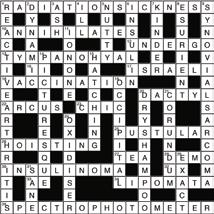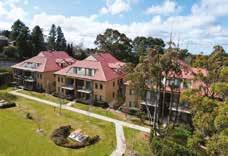
18 minute read
News in brief
UNITED KINGDOM
COVID-19 vaccine systems: a template for other health goals
The vaccine infrastructure created for COVID-19 should be maintained for other illnesses, says health-policy expert.
Developing a global adult-vaccination program out of the infrastructure built for COVID-19 would be as profound a legacy for public health as the creation of the United Nations out of the ruins of the second world war was for international relations, says Sir John Bell, former president of Britain’s Academy of Medical Sciences. “COVID-19 has cost millions of lives and exposed weaknesses in public health care. We have a moral responsibility to learn from it, act and save others,” he wrote in The Economist. “In the past, it was impossible to imagine a global adultvaccination programme. Today it is realistic. This is because the pandemic has accelerated advances in vaccine development, manufacturing and delivery, as well as the build-out of technology systems, health centres and trained staff.” This infrastructure should now be applied to other adult vaccines and injectable medication, he argues. “Vaccine technology has progressed dramatically. A new generation of tools will soon be available to tackle many of the most dangerous pathogens in the world.” These medical tools will be effective not only against infectious diseases, but long-acting injectable therapies will also be available against cardiometabolic diseases such as obesity, hypertension, diabetes and cardiovascular disease, he said. ‘COVID-19 has cost millions of lives and exposed weaknesses in public health care. We have a moral responsibility to learn from it, act and
save others.’ — Sir John Bell
AUSTRALIA
Victorian health service can fire nurses who refuse COVID-19 vaccine, court rules
An injunction to stop Victoria’s largest public health service from firing nurses who refuse the COVID-19 vaccination or refusing to disclose their vaccination status was thrown out by the federal court in November. A group of 90 nurses from Monash Health argued before the court that they should have been consulted before any disciplinary action was taken against them. The health service was acting on a directive from Victoria’s chief health officer under the Public Health and Wellbeing Act 2008 (Vic), which made it clear that health workers must be fully vaccinated, having received at least their first COVID-19 vaccine dose by 29 October in order to work in a healthcare setting. They had to provide evidence of vaccination to their employer. In the federal court, Justice John Snaden said the public health directions did not permit Monash to do anything else other than terminate employment. He dismissed the nurses’ argument that they should have been consulted before disciplinary action was implemented. He described their case as “at best, weak”. Chris O’Grady QC, representing Monash Health, said the employer had simply been following the chief health officer’s directions. “In light of the CHO directions, it goes without saying that anyone working in the health sector is going to have difficulty working in that sector, absent their willingness to either be vaccinated or disclose their vaccination status,” he said. The Supreme Court has also rejected several challenges to NSW Public Health Orders as has the NSW Civil and Administrative Tribunal. The Federal Court judge described the nurses’ case as ‘at best, weak’.
AUSTRALIA
NSWNMA welcomes bill on assisted dying
The Association welcomed the recent introduction of a draft bill to the NSW parliament by Independent MP Alex Greenwich, which aims to give those suffering from terminal and incurable illnesses the ability to die with dignity. NSWNMA General Secretary, Brett Holmes, said nurses and midwives had expressed support for a compassionate law to be introduced in NSW for many years. “Nurses and midwives have a duty of care to patients, and we acknowledge that people with a terminal or incurable illness should have the right to choice at the end of their life,” he said. “We understand not everyone agrees with voluntary assisted dying, but we will support members who exercise their conscientious objection, and this has been accommodated in the draft bill. “This legislation ensures everyone has access to palliative care options and we will continue to demand proper resourcing, including the availability of suitably qualified nurses and midwives. Nurse practitioners and registered nurses who choose to participate in voluntary assisted dying must be provided with education and protection for their work.” In a recent NSWNMA survey of members (with 2561 respondents), over 83 per cent indicated having professional experience in providing care to adults diagnosed with a terminal illness. Over half of those respondents said they had been asked by a terminally ill patient for assistance to end their life. The survey also revealed almost 87 per cent of respondents supported the introduction of legislation similar to laws passed in Victoria, Western Australia, South Australia, Tasmania and Queensland.
— NSWNMA General Secretary, Brett Holmes
STOP PRESS
As The Lamp goes to print the Voluntary Assisted Dying bill has passed the Lower House with a solid majority of 53 to 36.
CROSSWORD SOLUTION

Call the NSWNMA on 1300 367 962
Quality legal advice for NSWNMA members

• Workers Compensation Claims • Litigation, including workplace related claims • Employment and Industrial Law • Workplace Health and Safety • Anti-Discrimination • Criminal, including driving offences • Probate / Estates • Public Notary • Discounted rates for members including
First Free Consultations for members
Offices in Sydney and Newcastle with visiting offices in regional areas (by appointment)

BRAZIL
Bolsonaro’s handling of COVID-19 ‘a crime against humanity’
The Brazilian Senate has recommended that President Jair Bolsonaro be tried for his handling of the COVID-19 epidemic.
Bolsonaro has attracted worldwide notoriety for his COVID-19 scepticism and irresponsible behaviour during the pandemic, when he organised large gatherings of his supporters – without masks – and disparaged scientists and public health officials during the most intense periods of the outbreak. The Senate report said Bolsonaro’s insistence on treatment with the discredited anti-malarial drug hydroxychloroquine was “practically the only government policy to fight the pandemic”. It described his actions as a “crime against public health”. Bolsonaro’s abysmal handling of COVID-19 has resulted in 680,000 excess deaths in Brazil, according to calculations by The Economist. The Senate committee’s six-month investigation of the government’s handling of the pandemic called for prosecutors to try Bolsonaro on charges ranging from charlatanism and inciting crime, to misuse of public funds and crimes against humanity. More than 65 others are implicated in the report and could also face criminal proceedings. The decision on whether to prosecute the president will be up to Prosecutor General Augusto Aras, a Bolsonaro appointee who is widely viewed as protecting him. The allegation of crimes against humanity would need to be pursued by the international criminal court. Bolsonaro’s approval ratings plummeted during the Senate hearings – from 33 per cent to 22 per cent. During the six months the proceedings were broadcast live, half a million viewers regularly tuned in. ‘The Senate report described Bolsonaro’s actions as a “crime against public health.’
AUSTRALIA
A surge in people working more than one job
There are now 867,900 Australians working multiple jobs – the highest number since the Australian Bureau of Statistics began tracking secondary jobs in 1994. Worse yet, there are now a record number of Australians working three or more jobs – 209,100 – a shocking 10.8 per cent increase from June 2020. A new ACTU report has revealed that workers who do multiple jobs still earn 17.5 per cent less than the national average. Women working multiple jobs are significantly worse off than men, earning almost $10,000 less per year than their male counterparts. Women make up 53.7 per cent of multiple job holders. Millennials and Generation Z are most affected – 55 per cent of workers with two or more jobs are under 35. Multiple job holding has surged most in administrative and support services. Healthcare and social assistance also saw one of the largest increases in multiple job holding. Employers offering insecure work is driving this surge in people working multiple jobs, says the ACTU. “The Morrison Government is overseeing the erosion of the financial security that secure employment has provided for generations of Australian workers,” said ACTU Secretary, Sally McManus. “It urgently needs to address the insecure jobs crisis plaguing this country. Australian workers have been doing it extremely tough for almost two years.” ‘The Morrison Government is overseeing the erosion of the financial security that secure employment has provided for generations of Australian workers.’
AUSTRALIA
Important super changes introduced
Federal government changes to super that “staple” a fund member to a performing fund for their working life were introduced on 1 November.
The new super laws ensure that, unless you actively choose otherwise, your active super account or the first fund you joined when you started working will follow you throughout your working life, even if the fund is poor-performing. This is what is known as “member stapling” in the legislation. The goal is to avoid a person having more than one super fund and paying multiple fees, which would erode retirement savings unnecessarily. If you do not provide your fund of choosing, it will be an employer’s responsibility to search and check with the ATO if their new employee has a “stapled” super fund and ensure that future SG contributions are paid into it. Stapling does not apply to members working in the NSW Public Health System. Aware Super – a “top-performing” fund – is nominated as the default fund for employees under the First State Superannuation Act 1992 (NSW). Aware Super recommends that if you change jobs: • check with your new employer’s payroll team and request a Superannuation
Standard Choice form to provide them with your chosen super account details • research and review your superannuation fund’s performance. An underperforming fund can mean less for you in retirement, which could mean you’ll need to work longer.
For more information
Your super, your choice: https://www.industrysuper.com/ understand-super/super-basics/ your-super-your-choice/
AUSTRALIA
Underpaid injured workers to share $38 million payout
A review of 16,000 workers’ files found 3.5 per cent had been underpaid due to an error in the way the insurer, icare, was calculating their earnings before their injuries.
At least 53,000 injured workers will now share in a $38 million payout from the NSW public insurer, and icare’s chief executive has had to make a “sincere apology” for miscalculating payment amounts. The calculation errors were made between 2012 and 2019. NSW Shadow Treasurer, Daniel Mookhey, told The Guardian that the decision was “a big step forward for justice” for injured workers, who had been the victims of “the biggest act of wage theft committed by any Australian government”. He said the government should guarantee the repayments would cover the state’s public service. Unions NSW raised its concerns about the bureaucratic hoops that injured workers faced before they could be compensated. “icare must err on the side of accepting further claims from people who have been underpaid,” Unions NSW secretary, Mark Morey, said. “There may be many thousands more sick and injured workers whose underpayments have not been captured by this review. icare needs to give them the benefit of the doubt.” Morey said the icare saga should prompt a “fundamental rethink” of how the state treats sick and injured workers.




Take a look at these fabulous holiday offers Never pay full price for a holiday again
Free As restrictions lift many of us will be looking to book a welldeserved holiday. UBOOKDIRECT offers all NSWNMA $20 voucher members discounted rates on 100's of hotels state-wide and when the borders open 1000's Australia-wide. UBOOKDIRECT is giving members a $20 voucher to use on any already discounted member package when booking through the Concierge. To book one of these fantastic packages call 1300 959 550 or email bookings@ubookdirect.com.au
21% OFF 20% OFF 29% OFF


Leisure Inn Spires – Blue Mountains, NSW

Enjoy a staycation just an hour away from Sydney for only $240 for 2 nights! Leisure Inn Spires offers a peaceful studio and apartment in this UNESCO World Heritage Site. Located just an hour away from Sydney, attractions such as the Three Sisters, Scenic Railway and Jenolan Caves are all within a short drive.
Studio Room – 2 nights
$240* (2 ADULTS)
• Free car parking • Unlimited internet access
Leisure Inn Spires: valid until 31 March 2022. Rate based on 2 adults and subject to availability • YEHS Sydney Hotel Harbour Suites: valid for travel until 31 August 2022. Rate based on 2 adults and subject to availability • Leisure Inn Pokolbin Hill: valid for travel until 31 March 2022. Rate based on 2 adults and subject to availability. For full t&c’s go to https://travelbenefits.ubookdirect.com
YEHS Sydney Hotel Harbour Suites – Sydney, NSW
Stay 1 night or more in Sydney's CBD for as little as $121!
Located in Sydney, 1.8 km from Hyde Park Barracks Museum, Sydney Hotel Harbour Suites is a 4-star hotel with city views. It features new refurbished apartments with a restaurant, private parking, indoor pool, fitness centre, sauna, and a shared lounge.
Premium Queen Room with Kitchen – 1 night
$121* (2 ADULTS)
• 12pm late checkout • Free WiFi during stay
Leisure Inn Pokolbin Hill – Hunter Valley, NSW
From just $214 for 2 nights! Enjoy a retreat set in the heart of the Valley Wine Country. Leisure Inn Pokolbin Hill is located within walking distance to Hunter Valley Gardens. The hotel offers studio, and self-contained 1 and 2 Bedroom Apartments featuring private patios with peaceful views of hotel grounds, river and vineyards.
Studio Spa Queen – 2 nights $214* (2 ADULTS)
• Complimentary WiFi during stay • Free car parking
Can’t find what you’re looking for?
Contact the Member Concierge desk to discuss thousands of hotel deals on offer across Australia and New Zealand. To book one of these fantastic packages email bookings@ubookdirect.com.au or call 1300 959 550. For all other packages, head to https://travelbenefits.ubookdirect.com
Australian Nursing and Midwifery Federation New South Wales Branch Summary of Financial Information for the Year Ended 30 June 2021
The financial statements of the Australian Nursing and Midwifery Federation New South Wales Branch have been audited in accordance with the provisions of the Industrial Relations Act, 1991 and the following summary is provided for members in accordance with Section 517(2) of the Act, as applied by section 282(3) of the Industrial Relations Act, 1996.
A copy of the Financial Statements, including the independent Audit Report, will be supplied free of charge to members upon request. Certificates required to be given under the Act by the Committee of Management have been completed in accordance with the provisions of the Act and contain no qualifications.
SUMMARY STATEMENT OF PROFIT OR LOSS OR OTHER COMPREHENSIVE INCOME FOR THE YEAR ENDED 30 JUNE 2021
2021 ($) 2020 ($)
Service fee – NSW Nurses and Midwives’ Association (NSWNMA) 25,050,091 23,845,455 Interest income 53,836 119,242 Other income 569,632 254,769 Total income 25,673,559 24,219,466 Less total expenditure (24,688,916) (24,069,648) Result for the year 984,643 149,818 Remeasurement of retirement benefit obligations 426,610 139 Total comprehensive income for the year 1,411,253 149,957
SUMMARY BALANCE SHEET AS AT 30 JUNE 2021
Total equity Represented by: Current assets Non-current assets Total assets Current liabilities Non-current liabilities Total liabilities Net assets 1,804,939 393,686
7,765,857 6,381,732 4,241,732 3,868,608 12,007,589 10,250,340 9,256,778 8,716,601 945,872 1,140,053 10,202,650 9,856,654 1,804,939 393,686
INFORMATION TO BE PROVIDED TO MEMBERS OR REGISTRAR
In accordance with the requirements of the Industrial Relations Act, 1991 [NSW] the attention of members is drawn to the provisions of Sub-Sections (1) and (2) of Section 512 which read as follows: (1) A member of an organisation, or the
Industrial Registrar, may apply to the organisation for specified information prescribed by the regulations in relation to the organisation. (2) An organisation must, on the making of such an application, make the specified information available to the member or the
Industrial Registrar in the manner, and within the time, prescribed by the regulations.
REPORT OF THE INDEPENDENT AUDITOR ON THE SUMMARY FINANCIAL STATEMENTS TO THE MEMBERS OF THE AUSTRALIAN NURSING AND MIDWIFERY FEDERATION NEW SOUTH WALES BRANCH Opinion
The summary financial statements, which comprise the summary balance sheet as at 30 June 2021 and the summary statement of profit or loss and other comprehensive income for the year then ended are derived from the audited financial report of Australian Nursing and Midwifery Federation New South Wales Branch for the year ended 30 June 2021. In our opinion, the accompanying summary financial statements are a fair summary of the audited financial report.
Summary Financial Statements
The summary financial statements do not contain all the disclosures required by Section 510 of the Industrial Relations Act, 1991 [NSW] or Australian Accounting Standards. Reading the summary financial statements and the auditor’s report thereon, therefore, is not a substitute for reading the audited financial report and the auditor’s report thereon.
We expressed an unmodified audit opinion on the audited financial report in our report dated 14 October 2021. Our Independent Auditor’s Report to the members on the Financial Report did not contain any particulars of any deficiency, failure or shortcoming as referred to in the Industrial Relations Act 1991 [NSW], as applied by Section 282(3) of the Industrial Relations Act, 1996.
Committee of Management’s Responsibility for the Summary Financial Statements
The Committee of Management is responsible for the preparation of the summary financial statements.
Auditor’s Responsibility
Our responsibility is to express an opinion on whether the summary financial statements are a fair summary of the audited financial report based on our procedures, which were conducted in accordance with Auditing Standard ASA 810 Engagements to Report on Summary Financial Statements.
Daley Audit
Stephen Milgate Partner 14 October 2021, Wollongong Liability limited by a Scheme approved under Professional Standards Legislation
A copy of the Financial Report, including the Independent Audit Report, is available to members on the Member Central portal accessed via www.nswnma.asn.au. Members can obtain a hard copy by emailing the Branch Secretary, ANMF (NSW Branch) at gensec@nswnma.asn.au or calling 1300 367 962.
Nobel prize won for showing increase in the minimum wage doesn’t cost jobs
Groundbreaking study on the minimum wage that has reshaped the field of economics.
The Nobel Prize for Economics this year has been awarded to an economist for a study that revolutionised thinking about the minimum wage and the way economics should be studied.
David Card, with his associate Alan Krueger, found that an increase in the minimum wage did not kill jobs. The research was a bombshell for the economic world, challenging an orthodoxy that had dominated the field for decades.
Before their study it was accepted that “everyone knew” that increasing the minimum wage would cost jobs, as employers wouldn’t have the money to keep on as many staff.
Card and Krueger conducted an innovative “natural experiment”, which was based on real life rather than the purely theoretical framework that had been done previously.
In 1992, the US state of New Jersey increased its minimum wage to be the highest in the US. The neighbouring state of Pennsylvania did not.
Card and Krueger surveyed 400 outlets on either side of the border, to see if there were any changes to the number of workers employed in the cities that only differed in what they had done to the minimum wage.
They emphatically found that the rise in the minimum wage had not cost jobs.
Their work has since been supported by the International Monetary Fund and the OECD. It has been cited in judgments of Australia’s Fair Work Commission in their minimum wage decisions.
Prof. Card’s alma mater, University of California, Berkeley, said he had “challenged orthodoxy and dramatically shifted understanding of inequality and the social and economic forces that impact lowwage workers”.
Card also conducted research with similar “real life” methodology, which found immigration did not reduce native-born workers’ wages. In a 1990 study he analysed what happened to the labour market in Miami after 1980, when there was a large influx of immigrants from Cuba.
The arrival of the immigrants – known as the Mariel boatlift – “had virtually no effect on the wage rates of lessskilled, non-Cuban workers”.
Why the minimum wage is important
A high minimum wage is not only important for ensuring low-paid workers don’t live in working poverty, it also determines whether an economy takes the trajectory of a high-wage economy or a low-wage one. In the United States nearly one in four workers is defined as low wage. It has the third highest percentage of lowwage workers in the OECD. Only Latvia and Romania are worse. The US federal minimum wage is just $7.25 an hour. It hasn’t increased since July 2009. A Brookings Institute study found that 53 million Americans hold low-wage jobs with a median pay of $10.22 an hour, and median annual earnings of $17,950. The US business community relentlessly opposes any minimum wage increases, arguing that raising the wage floor would be a job killer. In Australia it has been no different, with business organisations and Coalition governments perennially regaling the Fair Work Commission with submissions arguing against a rise in the minimum wage for the same reason – that it would have adverse impacts on employment.




